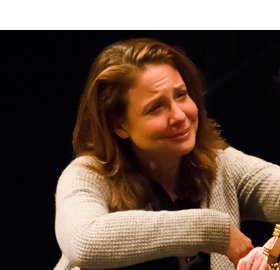Sarah Ruhl’s script for How To Transcend a Happy Marriage describes the character of Jane as “in her late forties or so. Capable.” Both Jane’s life-stage and her resourcefulness were topics of conversation when I met Robin Weigert, who plays her, before a performance the other night.
“In some ways, Jane is in a second adolescence,” Weigert continued. “She has built a stable life for herself, she has a family, a career. She does not know she is in rebellion against the life she’s built, even as she actively courts instability the whole first act. There is a passion in Jane, just as there is a passion in her teenage daughter, that cannot be contained, that causes her to experience stability as confinement.”
Weigert, who grew up in Washington, D.C., said that some of her friends in Los Angeles, where she now lives, reach life’s mid-point and engage in “spiritual questing. They do things like go to Burning Man, or try Ayahuasca, in an attempt to crack their reality wide open, to get back in touch with feelings they may have buried decades ago.” Jane’s animal hunger and spiritual yearning, Weigert speculated, “are likely intensified by the fact that she is adept enough with language that she can quite convincingly argue against their legitimacy. Attorneys are, perhaps, uniquely susceptible to self-deception. They are trained to present a convincing case, no matter how suspect the client. It is only after Jane is stripped of language and reduced to her animal nature that she is forced to confront the truth. In contrast to the first scene in which her dialogue is precise and witty, Jane spends the whole last third of the play struggling mightily to find the right language to express herself at all. Her relative inarticulacy here is one of the reasons that a single, beautifully worded body cry right at the end stands out in such relief. I see her journey as a spiritual one in which language must first be disabled in order to be reclaimed.”
“The physical body as a spiritual vessel is an important element in the play,” Weigert explained. “It has been said that ours is a country with an ideology born of Christianity, but how has Christianity led us to be so divorced from our bodies? Catholicism, for all its rigidity, is a very fleshy religion. I’ve always seen the Eucharist as a passionate practice. Eating the body of Christ and thereby being transmogrified has a lot in common with the sexual act. Puritanism may preach asceticism, but to figure denial as a matter of such importance is, in and of itself, a form of acknowledgement. The only truly disembodied branch of Christianity I can think of is one widely embraced today in the U.S. and that conflates material wealth with being one of God’s anointed. This new branch of the religion, born of Capitalism and spread by mega-churches throughout Christendom, it seems, is deeply frightening to me. I can’t imagine a conception of grace more divorced from the physical body than one that proposes God rewards virtue with material gain. One of the reasons I gravitated so strongly to Sarah’s beautiful play is that I felt she was attempting to reclaim something tremendously important both spiritually and culturally. Transcendence is not an acquisition, it is a state of being.”
Portraying Jane isn’t Weigert’s first time at LCT’s Mitzi E. Newhouse Theater. In early 1998, shortly after completing her MFA in acting at NYU, Weigert took over roles originated by Angie Phillips in the Newhouse run of Tina Howe’s Pride’s Crossing. “When I came back to the Newhouse for this new play,” Weigert said, “I had such specific memories of my first time in the place. I could look at a vom and remember vividly entrances and exits I had made there.” (Another Newhouse connection: Jon Robin Baitz’s Other Desert Cities premiered there in 2011, and Weigert made an acclaimed appearance in the play’s West Coast premiere in 2012.) Later in 1998, Weigert was in the ensemble of Twelfth Night, on LCT’s Vivian Beaumont stage. A highlight of that experience: the Al Hirschfeld drawing for the New York Times. “I was only one of three tiny figures at the back of the artwork, under an umbrella, but I felt as if I’d arrived.”
As Jane in the Ruhl play, Weigert is more exposed than in the Hirschfeld drawing. “In the first act,” she said, “much of what Jane’s dealing with is unconscious, withheld from her awareness by shame. In the second act, she is stripped of the wherewithal to deny the truth, and shame is vanquished. It’s quite a journey.”
Brendan Lemon is the editor of lemonwade.com.
